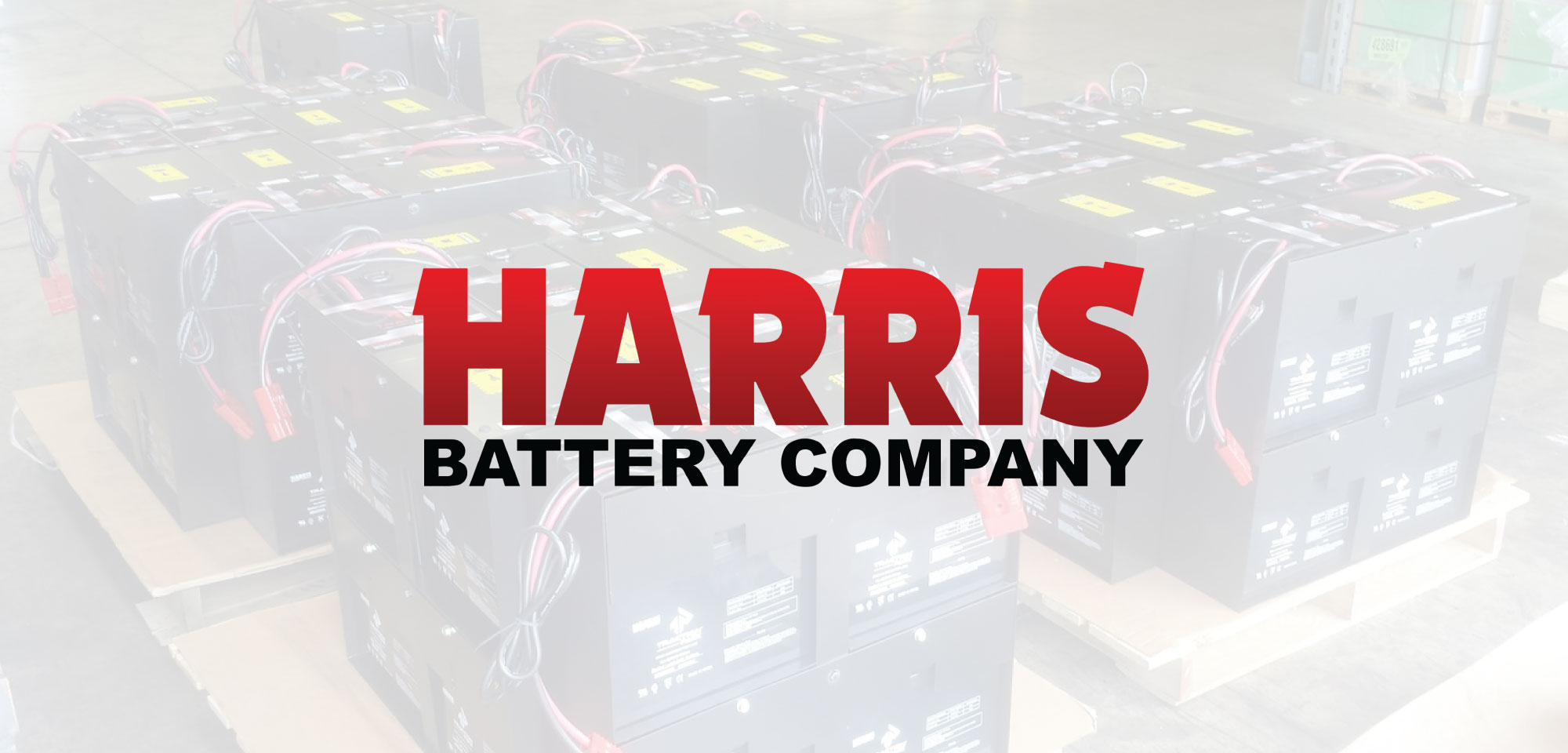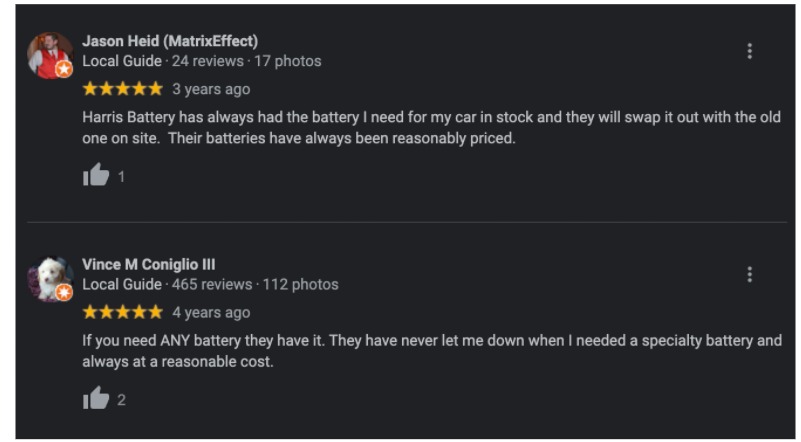Updated 1 year ago
Complete review of Harris Battery
Written by
Michael Cheng

Find out what solar panels cost in your area
The solar battery market is dominated by the likes of Tesla, LG, and Generac. There’s nothing wrong with going with these brands for your solar batteries - just know that when choosing a battery for your solar installation, you don’t have to stick with these manufacturers.
There are battery companies with comparable energy storage products, one being Ohio-based Harris Battery. Which models should you consider for your home, and how do they stack up against big name brands? Let’s find out.
Key takeaways
-
Harris Battery is a family-owned battery manufacturer with headquarters in Bolivia, Ohio and distribution sites across the country.
-
The business sells LFP and deep cycle AGM batteries for solar installations.
-
Compared with other battery brands like LG, Generac, and Tesla, Harris Battery offers similar capacities and performance with product support and affordable pricing.
-
In our view, the company’s products are reasonable options for residential solar and battery backup systems. However, they do not sell directly to end users, making them difficult to get your hands on unless you can find a local solar installer to sell them to you.
Overview of Harris Battery company
Harris Battery specializes in custom Original Equipment Manufacturer (OEM) battery products and portable power solutions. OEM refers to businesses that make components for other company’s end products.
With headquarters in Bolivar, Ohio, the business has been around for more than 40 years and serves the solar, commercial, agriculture, marine, transportation, and renewable energy sectors.
Interestingly, Harris is one of the largest battery recyclers in the country, which is an aspect of the business that helps it stand out from their competitors. Their process uses Environmental Protection Agency-certified smelters, which reduces pollutants during the recycling program. Battery recycling is an intensive process that requires safe handling by battery experts.

Reviews for the company’s products are generally positive.
Harris batteries for solar systems
When it comes to purchasing a solar battery backup from Harris, you could go with either their lithium iron phosphate battery or the deep cycle AGM battery. Let’s look at these two options.
Lithium iron phosphate batteries (lithium)
Harris Battery offers a robust line of lithium ion batteries, specifically lithium iron phosphate (LFP) batteries that are compatible with most standard residential inverters on the market. Harris LFP batteries come with a 10-year limited warranty and cater to 24 volt (V) and 48V or higher systems.
These batteries are offered in capacities ranging between 5 and 30 kilowatt-hours (kWh) or higher. This range is wider than what other solar batteries offer. At these capacities, you can store energy from your solar panels and run basic appliances or power numerous devices simultaneously for many hours, depending on the load. Homes that require large battery backup solutions can purchase several units to meet their specific power requirements.
Harris’ lithium iron phosphate batteries have the ability to come with UL-certified battery management systems (BMS), which are designed to improve monitoring, performance, safety, and lifespan during use. BMS’ are located between the battery and inverter(s) in a solar system installation.
Deep cycle AGM batteries (lead acid)
In addition to LFP batteries, Harris sells deep cycle absorbent glass mat (AGM) batteries for solar panel systems. They are a kind of lead acid battery that are designed for solar installations that are 6V and 12V or higher, and are suitable for every type of home solar installation: grid-tied, hybrid, and off-grid.
Harris’ AGM batteries are offered in various standard capacities ranging between 210 and 330 amp-hours (aH). The reason these batteries are rated in aH and not in kWh is because the commercial batteries have other applications outside of solar (like golf carts and boats) that require them to be rated this way.
Harris AGM batteries have an 18-month warranty and multiple batteries can be used to meet the power requirements of a large home. Unlike Harris LFP batteries, these units do not come with BMS. This isn’t an issue, as deep cycle AGM batteries do not usually come standard with built-in BMS.
Which Harris solar battery is best for my home?
| LFP | Deep cycle AGM |
|---|---|---|
Cost | $900 per kWh | $370 per kWh |
Lifespan | 2,000 cycles | 300-500 cycles |
Depth of discharge | 90-100% | 50-80% |
Efficiency | 90% or higher | 85% or lower |
Cold weather | Not as reliable | Performs well |
Weight | 26 lbs for a 1.2 kWh battery | 60 lbs for a 1.2 kWh battery |
Based on the table above, when it comes to solar battery backup, LFP batteries are generally better than AGM batteries. AGM batteries tend to suffer from shorter cycles, and should be kept in a fully-charged state, while lithium batteries don't have such limitations.
Choosing between the two types will mostly depend on the following factors:
Type of solar installation
Your location
Power usage
Installation requirements
Budget
Go with the deep cycle AGM batteries if:
You’re on a budget and you live in an area that experiences harsh winters. If this is the case, it makes sense to go with Harris’ deep cycle AGM batteries. This type of battery performs well in cold weather and comes with lower upfront costs, compared to LFP units.
Go with the LFP batteries if:
You have a bigger budget, you need to power large appliances for long periods of time, there are weight limitations for your installation, and long-term performance is a major concern. This option caters to these requirements, as LFP batteries have a larger depth of discharge, longer lifespan, more reliable features, and lightweight properties.
When it comes to costs, deep cycle AGM batteries are initially cheaper to own than LFP units. However, over their lifetime, most LFP batteries on the market come out cheaper at $899 per kWh versus $1,065 per kWh for AGM units, and are better long-term investments for solar. This is because LFP batteries last longer, can be discharged to deeper levels, and offer more cycles.
Comparing Harris batteries with other solar battery companies
Generac, LG, and Tesla offer lithium batteries, as this technology has become the latest standard for solar energy storage.Therefore, we’ll focus solely on Harris’ lithium ion batteries in our comparison, specifically their 10.2 kWh battery, the ReLi24-10.2.
| Harris ReLi24-10.2 | Generac PWRcell | LG RESU10H Prime | Tesla Powerwall |
|---|---|---|---|---|
Cost* | $7,000-$8,500 | $10,000 | $7,000-$8,000 | $9,300 |
Capacity | 10.2 kWh | 9 kWh | 9.6 kWh | 13.5 kWh |
*Cost before installation
Cost
The Harris battery with 10.2 kWh capacity costs between $7,000 and $8,500 before installation.
This price is better than the Generac PWRcell with 9 kWh capacity at $10,000. The Harris battery is roughly within the same price range as the LG RESU10H Prime with 9.6 kWh capacity, which costs between $7,000 and $8,000.
The price of a Tesla Powerwall sits at $9,300 before installation, but it comes with slightly higher capacity and power output.
Performance
Round-trip efficiency refers to the charging and discharging capabilities of the unit. Higher round-trip efficiency translates to less energy losses. Unfortunately, the round-trip efficiency of the Harris ReLi24-10.2 is not available on Harris’ website.
The Generac PWRcell features one of the highest round-trip efficiency rates out of the group at 96.5%. The LG RESU10H Prime and Tesla Powerwall offer 90% round-trip efficiency.
The depth of discharge for Harris lithium batteries, Tesla Powerwall, and LG RESU10H Prime is 100%. The Generac PWRcell has a depth of discharge of 84%. A higher depth of discharge is better, because it allows you to use more of the stored energy.
For the Harris ReLi24-10.2, LG RESU10H Prime, and Tesla Powerwall, using the battery to its maximum depth of discharge of 100% does not void the unit’s warranty. Although these batteries can be discharged to very low levels, it is not recommended to do so frequently. This action reduces battery life and discharge cycles over the unit’s lifespan.
Warranty
Harris LFP batteries come with a 10-year limited warranty. Unfortunately, the warranty does not specify coverage for capacity or throughput. There is no coverage for the battery reaching its maximum cycles before the warranty period.
The LG RESU10H Prime and Tesla’s warranties ensure 70% capacity for 10 years. The Generac PWRcell does not provide coverage for end-of-warranty capacity, instead the company offers throughput performance coverage. The Tesla Powerwall offers the best warranty out of the group, as it guarantees unlimited cycles within the 10-year warranty period.
The Generac PWRcell comes with a 7.56 MWh throughput warranty, while the LG RESU10H Prime features a 32 MWh throughput warranty. This type of coverage focuses on the amount of energy cycled through the batteries during the warranty period.
Should you buy products from Harrisbattery.com?
If you’re looking for batteries for your residential solar installation, Harris is worth checking out. They offer the latest lithium battery technology for solar; the same type offered by top brands. Customer reviews for the company’s products are mostly positive, with many boasting wide product selection, quick lead times, and reasonable pricing.
For the 10 kWh range, the Harris LFP battery costs $7,000-$8,500 and is similar to the LG RESU10H Prime at $7,000-$8,000. Unfortunately, getting your hands on Harris batteries isn’t easy, compared to popular brands with widely-available products. The business does not sell directly to end users. Instead, they provide their batteries to local solar installers throughout the country for them to include in their product line.
This means if you want to have Harris batteries for your home, you would need to find a local solar installer that carries the products and offers installation services in your area.
Michael is a content writer with more than six years of experience in industrial manufacturing and legal documentation, covering electrical safety, large-scale infrastructure, and maritime legislation. As a former member of the SolarReviews editorial team, he created technically informed content focused on solar energy....
Learn more about Michael Cheng